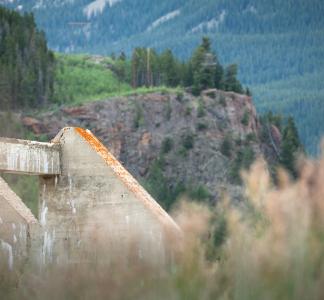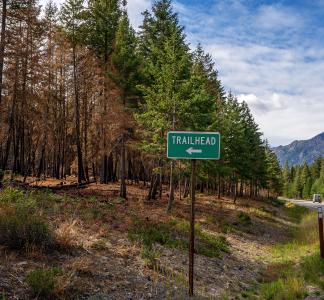A big attack on climate progress (and 3 other things to expect from the new Congress)

Oil and gas development on BLM lands around Bakersfield, CA.
Bob Wick, BLM
Forecast shows aggressive pro-fossil fuel bills from Congress, but more Biden-led conservation
The 2022 midterm election is in the rearview mirror. So now we never have to think about it again!
Alas. As of Jan. 3, new and returning members of the House and Senate are back in Washington, DC, and re-starting the business of running the nation (or, in some cases, grinding it to a halt).
Below, we take a look at four things we can expect from the 118th Congress, starting with one terrible, horrible, no-good, very bad climate attack.
1. We’ll have to fend off aggressive anti-climate action bills right away
One of the top priorities of incoming House leaders will be tearing down climate progress—likely including pieces of last summer’s historic climate bill—and doing everything possible to enable and extend our national fossil-fuel addiction.
Literally one of the first things leaders in the new Republican-controlled House have said they plan on doing is introducing a legislative package that would encourage drilling and mining, gut environmental review standards and revive the unfinished Keystone XL pipeline.
In fact, Republicans are already on the cusp of bringing up a more focused (but ridiculous) bill for a vote. That legislation would insist on a certain amount of new oil and gas leasing on public lands, ostensibly to offset withdrawals from the national Strategic Petroleum Reserve. It’s another chest-thumping stunt intended to get more acreage in the drilling-and-destruction queue, masquerading as a real plan to increase national security and lower gas prices.
The specifics of the bigger anti-climate action package remain uncertain, but this much is clear: very soon, House Republicans want to vote to take a huge step backward. One of our most important jobs will be telling members of Congress (especially new members of Congress) that they must not support that anti-climate action bills...and if they do, we intend on holding them accountable for it.
2. It’s time to play defense
It won’t stop with those anticipated early anti-climate solutions bills. A new balance of power in the House means we’ll be playing relentless defense for the next two years. That will include marshaling opposition to legislation that aims to claw back land protections and fatten fossil fuel interests.
It probably will end up looking like some other recent periods when anti-conservation lawmakers held sway—for instance, the 115th Congress (2017-2019), when we had to fend off efforts by extremist congressmen to sell off millions of acres of public lands. Sure enough, House leadership just voted to adopt a set of rules very similar to one passed five years that would simplify and encourage the “sale, donation, or exchange” of national public lands.
Even in the Senate, where the political prospects are a bit rosier, there will only be a narrow path to success on conservation issues. Once again, a few key senators will carry outsized influence, and nothing will be easy. That brings us to Plan B: administrative action.
3. The big focus will be what the Biden administration can do on climate and conservation
We already know we’ll have to play defense in 2023 and beyond. The 118th Congress will not be an easy place to get good bills passed, and we’ll have to work hard to stop bad bills from advancing. So how can we continue to make progress on climate and conservation goals?
Fortunately, there are still a lot of opportunities to get things done with the Biden administration. On climate, they’ve already turned their attention to implementing the pieces of the big climate law. Additionally, they should continue working toward a new national forest policy to preserve old-growth and mature forests, which are critical for absorbing climate-change pollution from the atmosphere.
There will also be plenty of chances to take steps toward the goal of protecting 30 percent of lands and waters by the year 2030, a benchmark recently echoed in an international agreement at the COP15 biodiversity conference. A new policy for protecting old and mature forests will be critical in this effort, too.
The Biden administration also has a chance to create and expand our system of national wildlife refuges, boosting both access to nature for all and protected habitat for species. Additionally, we’ll be advocating for a new conservation-first approach for the Bureau of Land Management (BLM), the nation’s largest land management authority by acreage. Although the BLM has historically prioritized drilling and mining on the lands it manages, nothing says it has to. By using their existing capacity and putting some new policies in place, the agency could protect as much as 100 million acres of cultural resources and wildlands over the next decade. And lest we forget, President Biden himself also has authority to protect special natural and cultural sites with national monument status, as he recently did in Colorado’s Camp Hale-Continental Divide.
Especially as we address the longstanding problem of inequitable access to nature, it will be important to look beyond the feds, too. Implementing state outdoor equity funds, expanding public transit and various local-level initiatives will be a major part of making sure people can use (and feel safe and welcome in) public lands.
4. BUT...anti-conservation interests in Congress will do their best to block administration goals, too
While there are lots of opportunities for the Biden administration to get stuff done, they’ll have limited resources and time to do it. And Republican leadership is expected to pull out all the stops attempting to “scrutinize and slow down” climate progress (along with the rest of the president’s agenda).
That dynamic will make it even more important for groups like The Wilderness Society to focus on building the case for strong conservation solutions and the political will to see them to fruition. Over the next two years, we’ll rededicate ourselves to establishing sound scientific research; supporting community-led conservation efforts; advocating for local partners to have a say in making policy; and amplifying your voices to make sure decisionmakers in Washington, DC hear us loud and clear.
It’s time to gear up for a big fight—but with your help, it’s a fight we know we can win.
President Biden designates Camp Hale–Continental Divide National Monument, the first of his presidency
Mason Cummings, TWS
Forest Service takes more old growth steps, announces formation of Northwest Forest Plan advisory committee
Joe Whittle
New White House guidance aims to improve transparency and mitigate environmental, climate harms
Robert S. Donnovan



